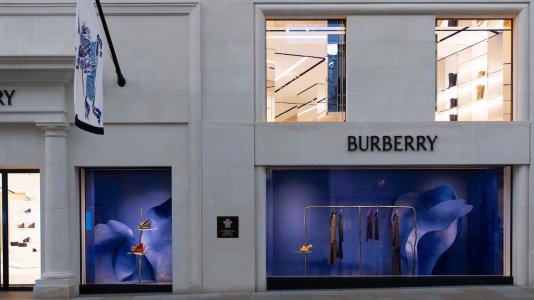Burberry is at a crossroads: What’s next
The British luxury brand is no longer ranked among the 100 most valuable companies on the London Stock Exchange. Its next steps are crucial.
BY KIRSTY MCGREGOR
September 4, 2024
It’s official: Burberry has fallen off the FTSE 100, the list of the 100 most highly capitalised blue-chip companies listed on the London Stock Exchange. The news was confirmed on Wednesday following the FTSE’s latest quarterly reshuffle.
While expected — given its share price has plummeted by 70 per cent since this time last year — it is nonetheless a blow to the British fashion industry. Burberry is the UK’s largest luxury fashion export, and the headline attraction of London Fashion Week. Many of the reasons for its decline are specific to the business, but it fuels wider concerns around the future of the industry.
Burberry is already fighting back. In July, it announced that
Jonathan Akeroyd was out as CEO, and it was drafting in industry veteran Joshua Schulman, whose career spans both high-end luxury and more aspirational brands such as Michael Kors and Coach. On Tuesday, Burberry announced that Schulman is bolstering his leadership team with two appointments.
Jonathan Kiman will join as chief marketing officer on 9 September from Gucci, where he held the same role, while Laura Dubin-Wander joined on 4 September as president of Americas from OTB North America, where she was CEO. In a statement, Schulman highlighted Kiman’s experience in “rejuvenating brands and building digital-savvy marketing organisations”, and Dubin-Wander’s “results-driven” approach. The company declined to comment on the FTSE reshuffle.
What the FTSE relegation means
When Burberry first joined the FTSE 100 in 2009, it was a triumphant moment for the business. Christopher Bailey and Angela Ahrendts were at the helm, and the brand relocated to London Fashion Week after years on the Milan schedule. In the years that have followed, Burberry has
struggled to get its positioning right.
Cracks started to show last year, when the company
said it may not be able to meet its forecast of low double-digit revenue growth for the 2024 fiscal year, blaming the “macroeconomic environment”. This was followed by a
profit warning in January after its retail sales tumbled 7 per cent during the all-important golden quarter, ended 30 December. In July, it revealed a worsening picture: retail sales were down 22 per cent in Q1 of its current fiscal year.
Industry observers and analysts are divided over the significance of the FTSE 100 relegation. Luca Solca, sector head for global luxury goods at strategic consultancy Bernstein, says he doesn’t expect it to have much impact on Burberry in a practical sense, nor on the wider industry; rather, it underlines an already-recognised need to pivot Burberry’s approach.
“The luxury market has been difficult in general recently, but Burberry has been particularly weak,” Solca says. “Technically, what has brought Burberry to fall off the FTSE 100 is a material downward correction in its share price. The reason for this has been a failure to develop the brand in the high end as proposed two years ago. This has brought the recent change of CEOs [Akeroyd joined Burberry in 2022, taking over from Marco Gobbetti].”
Adam Cochrane, analyst at Deutsche Bank Research, agrees that it will make no operational difference to Burberry, and may be the catalyst needed to make the necessary changes to get the business back on track. Though he adds: “From an investor standpoint, it does make it harder for some investors to invest in the company, given its size.” However, he does foresee a knock-on impact on the wider industry, especially given Burberry’s emphasis on its Made in UK heritage.
Others agree. “This is a blow for the whole sector in the UK,” says Stéphane Girod, professor of strategy and organisational innovation at Switzerland’s IMD Business School. “Most British luxury players stay small, or they are already foreign owned (Belmond, Rolls-Royce, Bentley, Penhaligon’s). The big question I have is: could Burberry be acquired by one of the two fashion conglomerates like LVMH and Kering? Considering the new CEO’s background, we could even see [Michael Kors owner] Capri Holdings becoming interested.”
He suggests that a number of factors have driven Burberry’s decline, including too heavy a reliance on its signature trench coat, an “insufficient strength” in accessories (which have become more important than clothes in driving growth) and its exposure to China. “The latter will continue to impact for quite a while — I do not expect a quick bounce back of the Chinese economy for political reasons.” All of this has been compounded by the luxury slowdown, which has hit brands that are perceived as sitting between the super wealthy and aspirational ends of the luxury pyramid.
Analysts agree that the new leadership team faces a number of challenges, but none terminal. “They should get a more realistic and more commercial perspective on what Burberry is and what it can be,” says Solca. “We have suggested a ‘British Coach’ strategy. Others have called for a ‘British Saint Laurent’. Sticking to what the brand is known and desirable for — the check pattern — having a more realistic price architecture in handbags, and an easier and more popular communication approach, too.”
Girod says that, alongside a resolute focus on quality, making in the UK, improving the retail experience and investing in growing accessories, stability will be key: this includes giving more time to Daniel Lee, who was
appointed chief creative officer in 2022. “He will get the brand there, but only if management supports his vision. The sudden
success of Miu Miu tells us that when a designer meets its markets, a brand can suddenly take off.”

